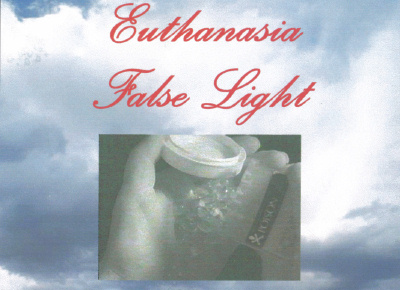“Kafer: Doctor assisted suicide for mental illness”
(Denver Post — May 20, 2022)
Depression creates a distortion in perception. It’s like being at the bottom of a murky lake and looking up through the dark water at objects on the surface. Good things seem less good, bad things look worse, challenge insurmountable….
When Colorado first debated assisted suicide back in 2014, my column warned voters that constraints on legalized assisted suicide would erode over time.
“Number of patients who sought medication to end their lives under Colorado’s aid-in-dying law on rise”
(The Colorado Sun — March 31, 2022)
Colorado Official Summary of Year Five
Data Summary, with 2017-2021 Trends and Totals
“Denver doctor helped patients with severe anorexia obtain aid-in-dying medication, spurring national ethics debate”
(The Colorado Sun — March 14, 2022)
A recent case study shocked psychiatrists across the country and added fuel to a long debate about whether right-to-die laws would lead to state-sanctioned deaths of people with mental illness….
Dr. Cory Carroll, a Fort Collins physician explained that the situation is confusing and difficult. He said that’s why “we call it the practice of medicine.”
Third Official Report for Colorado “End-of-Life Options Act” Issued
Issued in 2020 for activities in 2019 as well as statistics for the complete three-year period. 2017-2019.
According to the Report, “It is important to note that the Colorado End-of-Life Options Act does not authorize or require the Colorado Department of Public Health and Environment to follow up with physicians who prescribe aid-in-dying medication, patients, or their families to obtain information about use of aid-in-dying medication.”
Note: Unlike some other states, Colorado does not report the reasons given by patients for their request of the drugs for assisted suicide.
“Terminally Ill Man Sues Hospital Over Aid-In-Death Medication”
(Courthouse News — August 22, 2019)
A terminally ill man [Cornelius Mahoney] and his doctor filed a lawsuit against the Centura Health Corporation for prohibiting its doctors from prescribing aid-in-dying medication…Mahoney can transfer hospitals but he doesn’t want to.
[Note: One of the “safeguards” promoted by assisted suicide advocates when campaigning for the Colorado law had been the fact that health care providers would be able to opt out of prescribing drugs for assisted suicide on the premises. Now, those same advocates, including the former head of Compassion & Choices, is involved in suing the health care facility to force it into doing so. This is yet one more example of activists calling provisions in a bill “safeguards” — until the law is passed. Then, they declare that those same “safeguards” are “barriers.”]
Text of Colorado “End of Life Options Act”
Colorado End-of-Life Options Act, Year Two
2018 Data Summary, with updates to 2017 Data
(February 2019)
Colorado issues a sparse report on first year of legal doctor-prescribed suicide
“69 Coloradans seek assisted suicide in first year of program”
(Skyhinews — March 2, 2018)|
According to Kirk Bol of the Colorado Department of Public Health and the Environment, the law doesn’t allow follow-up to information submitted by doctors, nor does it give the right to find out if patients actually took the medication or any information about the duration between taking the drugs and death, complications, impressions or concerns.
2016 Colorado Initiative 145 (appeared on ballot as Proposition 106)
COLORADO PASSES DOCTOR-PRESCRIBED SUICIDE LAW. (November 8, 2016) For analysis of what that law permits, see Analysis of Proposition 106
“After Colorado, ‘Right To Die’ Movement Eyes New Battlegrounds”
(Kaiser Health News — November 9, 2016)
Diane Coleman, president of a national disability advocacy group called Not Dead Yet, said [such] laws create a dangerous financial dynamic in which insurance companies may deny expensive treatments but cover lethal drugs. “Will insurers do the right thing or the cheap thing?” she asked.
Denver Post editorial takes position opposing doctor-prescribed suicide measure.
“No on Proposition 106: Aid-in dying measure lacks proper safeguards”
(Denver Post — October 11, 2016)
The Denver Post editorial board has in the past supported proposed legislation that would have allowed doctors to prescribe life-ending drugs to patients with six months or less to live. We came down on the side of personal liberty before the bill failed in 2015….
In the end, despite our desire to support an individual’s right to make this decision, we cannot support a law that would so easily open an irreversible door.
“Fact check: John Hickenlooper stumbles over details on aid-in-dying measure”
(Denver Post — September 15, 2016)
The governor’s assertion that patients [in Oregon and Washington] apply for a Death with Dignity prescription primarily because they are in extreme pain is not accurate….[H]is assessment of the number of patients who ingest the lethal medication and the grounds cited for taking the medication are wide of the mark.
Doctor-prescribed suicide advocates collected 160,000 signatures to place Initiative 145, titled the “Colorado End-of-Life Options Act” on the November 2016 ballot. The measure will appear on the ballot as Proposition 106.
(98,072 valid voter signatures were required.)
According to campaign finance records filed with the Secretary of State, doctor-prescribed suicide activists paid $344,000 to a national company that gathers campaign signatures.
Text of Initiative 145 (Proposition 106)
Analysis of Initiative 145 (Proposition 106)
2016 Doctor-Prescribed Suicide Bills
Senate Bill 16-025
Text of bill
The bill failed to pass
The 2016 Colorado general election ballot could have two voter initiatives regarding assisted suicide or administered death. (April 8, 2016)
One proposal (#100) would amend the Colorado constitution to permit “Medical Aid in Dying” which is defined as the application of, and the support of the application of, a medical protocol that is lethal.
It specifically rules out assisting another to die by hanging or asphyxiation.
Text of 2015-2016 #100
The second proposal (#124), the “Colorado End-of-Life Options Act,” is loosely patterned after Oregon’s doctor-prescribed suicide law.
Text of 2015-2016 #124
Proposed ballot measure to be heard in Colorado
(September 9, 2015)
The proposed constitutional amendment (Amendment Number 2016#34) would legalize “medical aid in dying” and, if passed, would enshrine death on demand for any reason as a constitutional right.
Analysis of ballot measure
2015
A doctor-prescribed suicide bill, HB 15-1135, titled the “Colorado Death with Dignity Act” was introduced in Colorado but failed to get out of Committee.
Text of HB 15-1135
Analysis of HB 15-1135
On February 6, 2015, a committee defeated the measure citing the bill’s lack of safeguards and inability to prevent abuse.
Articles
Composting of human bodies is also called “natural organic reduction”
As of May, 2021, turning human bodies into fertilizer is legal in Colorado.
The Colorado bill (SB 21-006) was signed into law on May 10, 2021.
Colorado joints Washington which has permitted the practice since 2020.
“Fact check: John Hickenlooper stumbles over details on aid-in-dying measure”
(Denver Post — September 15, 2016)
The governor’s assertion that patients [in Oregon and Washington] apply for a Death with Dignity prescription primarily because they are in extreme pain is not accurate….[H]is assessment of the number of patients who ingest the lethal medication and the grounds cited for taking the medication are wide of the mark.
“Why 9News uses the words assisted ‘suicide'”
(Source: KUSA 9News, Denver Colorado — August 17, 2016)
This November, you’re going to get to vote on an assisted suicide law in Colorado. Supporters of that law have asked 9News not to call it assisted “suicide.” They’d rather call it “medical aid in dying.”…. We have a duty to tell you about it in simple, direct language. That’s why we are not going to stop using the word “suicide.”
“Assisted suicide initiative makes Colorado ballot”
(Colorado Springs Gazette — August 15, 2016)
An initiative allowing doctors to give lethal drugs to terminally ill patient has made the November ballot, Colorado’s Secretary of State announced Monday.
Yes on Colorado End-of-Life Options spent $2.9 million to reserve TV ad time, campaign finance records show. It also paid a national company another $344,000 to help gather signatures.
“Colorado End-of-Life Options Bill Is Pulled At the Capitol”
(KVNF Radio — February 24. 2016)
A bill that would have allowed terminally ill patients to take medication to end their own lives has failed in the Colorado legislature. The main sponsors asked lawmakers to defeat the bill before it could be debated by the full House.
“Letter: Physician-assisted suicide a bad move for Colorado”
(Coloradoan — February 4, 2016)
As a physician, I am also concerned that the bill would give government and profit-driven health insurance programs the opportunity to cut costs by denying payment for more expensive treatments while approving payment for less costly assisted-suicide deaths.
“Letter: Colo. shouldn’t legalize assisted suicide”
Response to Sept. 10 article regarding taxpayer-funded “end of life” play.
(Coloradoan — September 24, 2015)
Notice that Ronald Halperin, the professional speaker who goes around the country promoting assisted suicide laws, is the first panel member listed. Why is there no equivalent panel member on the opposite side, perhaps someone from The Patients Rights Council?
“Critic: Play uses public funding, promotes political agenda”
(Coloradoan — September 10, 2015)
A play, The Outgoing Tide,” that addresses “end of life” suicide is using taxpayer dollars to promote a political or moral agenda, says one Fort Collins resident who asked the city to pull its funding. It is being performed in memory of Charlie Hatchette, a Fort Collins doctor who advocated for a death with dignity law.
“Ginal plans to re-introduce right-to-die bill”
(Coloradoan — February 7, 2015)
Even though her right-to-die legislation failed in a House vote Friday night, Rep. Joann Ginal said she plans to bring it back next session….”I was very optimistic about getting it out of committee,” Ginal said. “But 12 hours of testimony swayed some of our Democrats.”
“Making lethal, legal”
(Colorado Springs Independent — February 4, 2015)
Carrie Lucas, a juvenile and disability rights attorney who lives in Windsor, is among the opponents. Lucas has muscular dystrophy that began shutting down her muscle function in her teens. Now 43, she is a quadriplegic who needs a ventilator to breathe. Since her disease is terminal, and without assistance she would be within hours of death, Lucas says she’d qualify for assisted suicide under HB 15-1135.




